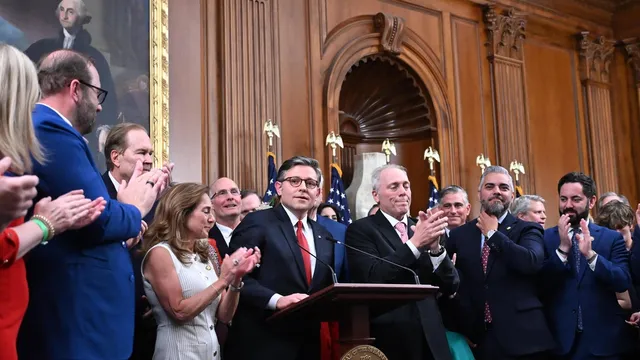
Republicans celebrate as Trump's spending bill passes amid public outrage
2025-07-04 11:36- The U.S. Senate approved President Trump's tax and spending bill, with all Democrats opposing the legislation.
- The House passed the bill, which proposes significant cuts to social programs such as Medicaid and SNAP.
- The legislation has been heavily criticized for prioritizing tax cuts for the wealthy over the welfare of low-income families.
Express your sentiment!
Insights
In the United States, the Senate approved President Donald Trump's significant tax and spending bill, referred to as the 'One Big, Beautiful Bill,' on July 2, 2025. The vote was tightly contested, resulting in a 51-50 outcome, which was only possible due to Vice President JD Vance casting the tie-breaking vote. All Senate Democrats opposed the bill, voicing deep concerns over its implications for American families and social safety nets. The bill proposes substantial cuts to Medicaid and SNAP, which could severely affect millions of low-income households and vulnerable individuals reliant on these programs. Following the Senate approval, the House passed the legislation on July 3, 2025, with a narrow 218-214 vote. This rapid legislative process has drawn sharp criticism from various stakeholders, including Michigan officials and organizations, who have expressed alarm over the potential consequences the bill would impose on social welfare initiatives. Michigan Senators Gary Peters and Elissa Slotkin spoke out against the bill, labeling it detrimental to the well-being of hardworking families and emphasizing that it primarily benefits wealthier Americans at the expense of ordinary citizens. The White House has positioned this bill as a critical component of Trump's agenda, boasting that it will deliver the largest middle-class tax cut in history while securing borders and enhancing military funding. However, critics argue that it essentially redistributes wealth from the poorest demographics to the richest, exacerbating poverty and hunger across the nation. The proposed changes to Medicaid could potentially lead to 11.8 million Americans losing their health coverage over the next decade, while simultaneously reducing access to food assistance programs like SNAP, which has been a lifeline for countless families. As the bill is set to be signed into law by President Trump on July 4, the administration is framing the event as a celebration of American values and a move towards economic prosperity. However, the response from the populace shows deep division and concern regarding the ramifications of this legislation. Public reactions have been intense, with reports of outrage expressed through social media channels, where footage of Republican lawmakers celebrating after the bill's passage sparked further condemnation. Many have called for accountability from their elected officials, emphasizing the need for drastic changes during the upcoming mid-term elections to counteract the perceived harm this bill could bring.
Contexts
The impact of Trump's One Big Beautiful Bill has been a subject of extensive analysis and discussion, given its implications for various sectors of the economy and society at large. This legislative package, which aimed to deliver comprehensive reforms across multiple domains, promised to reshape the landscape of American public policy. The bill focused on significant investment in infrastructure, healthcare, and tax reform, aiming to drive economic growth and job creation. Supporters argued that these investments would not only enhance the quality of life for many Americans but also stimulate private sector activity by improving the nation's infrastructure and reducing regulatory burdens on businesses. Critics, however, raised concerns about the bill's long-term fiscal sustainability and the potential for increased national debt as a result of the proposed spending measures. One of the most notable aspects of the One Big Beautiful Bill was its commitment to infrastructure development, which many considered long overdue. The United States has faced challenges related to aging infrastructure, including crumbling roads, bridges, and public transportation systems. By allocating significant funding for these projects, the bill aimed to create millions of jobs in the construction sector and related industries, supporting not only the economy but also increasing public safety and mobility for citizens. Additionally, advancements in technology and sustainable practices were a significant focus of the bill, aiming to modernize and enhance the nation's infrastructure while considering future environmental impacts. Healthcare reform was another critical component of the bill, particularly in the context of rising healthcare costs and access disparities. The legislation proposed measures to improve healthcare delivery and affordability, with an emphasis on preventive care and mental health services. By fostering competition among providers and reducing out-of-pocket expenses for consumers, the bill sought to create a more equitable healthcare landscape. However, the impact of these reforms was met with mixed reactions, with some stakeholders arguing that they did not go far enough in addressing systemic issues within the American healthcare system, leading to ongoing debates about the adequacy of these changes. Tax reform was a centerpiece of the One Big Beautiful Bill, with a promise to simplify the tax code and reduce rates for middle-income families and small businesses. Proponents argued that this strategy would enhance disposable income, thereby encouraging consumer spending and facilitating economic growth. Nevertheless, there were concerns expressed about potential tax increases on higher-income earners and corporations, which critics claimed could undermine investment and job creation. The ongoing discussions surrounding the One Big Beautiful Bill underline the complexities of balancing economic growth with fiscal responsibility, highlighting the need for careful consideration of both immediate effects and long-term consequences on the American economy and society as a whole.